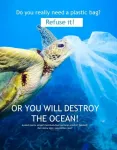Environmentally friendly behavior is easy -- tourists just need a 'nudge'
Simple cues reduce cognitive strain and provide a nudge -- helping tourists to demonstrate environmentally conscious behavior, such as refusing a plastic bag
2021-02-09
(Press-News.org) A new study in Frontiers in Communication has demonstrated the powerful impact that subtle messaging and cues, or 'nudges', can provide on encouraging people to show socially desirable behaviors. Travelers who were observed on the Indonesian island of Gili Trawangan, a popular tourist destination, were more likely to demonstrate environmentally conscious actions, such as refusing a plastic bag or avoiding contact with a coral reef, when they were 'nudged' towards the desirable action with either a written or face to face interaction. The researchers found that any intervention, whether framed positively or negatively, was enough to lead people to make environmentally conscious decisions, compared to being given no behavioral cues or messaging. The study provides many practical takeaways that can be easily implemented by tourist operators or businesses, at a low cost, to increase environmental stewardship and promote positive behaviors in their customers.
Although many of us feel a responsibility to demonstrate environmentally-conscious behaviors and possess the knowledge we need to take these actions, we are often burdened by numerous obstacles, a phenomenon the researchers describe as the 'knowledge-action gap'. Dr Katherine Nelson, who led the study in partnership with the Gili Eco Trust, explains:
"The gap between knowledge and action exists because it is much easier to think a certain way than it is to actually consistently behave in that manner -- but providing a subtle cue can help us relieve some of the cognitive burden on our brains when we are in a complex environment."
To try and close this gap, the researchers set up scenarios for tourists in two real life situations -- when being offered a plastic bag at a convenience store, and when given a briefing before a snorkeling trip. The researchers observed the differences in people's behavior based on whether a person was confronted with a written or face to face interaction of either a positive message highlighting good outcomes, or a negative message focusing on the bad outcomes of a specific action.
The study showed that the presence of a 'nudge' or cue towards certain behaviors was enough to encourage people to behave in more environmentally conscious ways, whether that was refusing a plastic bag whilst at the convenience store or ensuring they maintained a safe distance from turtles when on a snorkeling trip - whether this message was framed positively or negatively did not matter.
"Our study highlights that an intervention can lead people to making better decisions by just drawing their attention to an issue -- by providing a small cue, we can reduce the obstacles that get in the way and make environmental behaviors easy."
The results offer important insights on the effectiveness of simple messaging as a practical way to nudge people towards environmentally conscious behaviors. The tourist sector in particular has huge potential to utilize these types of approaches and make pro-environmental behaviors a simple choice to reduce local impacts.
INFORMATION:
[Attachments] See images for this press release:

ELSE PRESS RELEASES FROM THIS DATE:
2021-02-09
Asthma attack rates seen at GP surgeries fell significantly during the first Covid-19 pandemic lockdown of 2020, a study suggests.
Lower levels of air pollution, fewer cold and flu infections, and the fear of attending doctor surgeries due to Covid-19 were possible reasons for the 20pc drop in cases seen at GP surgeries, researchers said.
The study is the first national review of lockdown effects on asthma attacks and includes data from more than 100,000 patients.
Asthma attacks - or exacerbations - are bouts of shortness of breath, wheezing or a tight chest. There are usually more than six million GP consultations and 1400 deaths attributed to asthma in the UK every year.
For the study researchers from the University of Edinburgh looked at a national GP database ...
2021-02-09
Higher excess COVID-19 death risk in middle-aged people with type 2 diabetes raises vaccine prioritisation questions
A largescale analysis led by the University of Exeter and funded by Diabetes UK, has found a disproportionately higher COVID-19 death risk in middle-aged people with type 2 diabetes, raising questions over vaccination strategies across Europe.
The study, accepted for publication in Diabetologia, found that compared to people of a similar age without type 2 diabetes, the additional COVID-19 mortality risk from having type 2 diabetes increases the younger someone is. Although the ...
2021-02-09
Children aged between 5 months and 4 years attending daycare during lockdown in March to May 2020 in France had low rates of SARS-CoV-2 antibodies in their blood - known as seroprevalence - suggesting that virus infection rates were low in this population.
Research assessing seroprevalence in daycare centres that remained open during the first national lockdown in France, suggests that the rate of SARS-CoV-2 virus infection was low at 3.7%, with positive cases likely infected by an adult in their household, rather than whilst at daycare. The seroprevalence rate among daycare staff was similar to that of a control group of adults who were not exposed to children or COVID positive patients ...
2021-02-09
In the event of a pandemic, delayed reactions and a decentralized approach by the authorities at the start of a follow-up wave can lead to longer-lasting, more severe and more fatal consequences, researchers from the universities of Zurich and Toronto have found. The interdisciplinary team compared the Spanish flu of 1918 and 1919 in the Canton of Bern with the coronavirus pandemic of 2020.
The Spanish flu was the greatest demographic catastrophe in Switzerland's recent history, causing approximately 25,000 deaths in the country during 1918 and 1919. In the wake of the current coronavirus pandemic, there has been increased public and scientific interest in the events of that time. An interdisciplinary team of researchers in evolutionary medicine, history, geography and ...
2021-02-09
Oakland, Calif. -- An analysis of Kaiser Permanente members in Northern California early in the COVID-19 pandemic found racial and ethnic disparities in the likelihood of testing positive for the coronavirus, but no significant disparities in mortality among those who were hospitalized.
According to the study published Feb. 8 in Annals of Internal Medicine, Latino patients were nearly 4 times as likely as white patients to become infected with the virus, while Asian and Black patients were 2 times as likely to get COVID-19 as white patients. The odds of hospitalization were also higher for Latino, Asian, and Black patients with ...
2021-02-08
PITTSBURGH, Feb. 8, 2021 - With the aid of sophisticated machine learning, researchers at UPMC and the University of Pittsburgh School of Medicine demonstrated that a tool they developed can rapidly predict mortality for patients facing transfer between hospitals in order to access higher-acuity care. This research, published today in PLOS One, could help physicians, patients and their families avoid unnecessary hospital transfers and low-value treatments, while better focusing on the goals of care expressed by patients.
Each year, nearly 1.6 million patients--or as much as 3.5% of all inpatient admissions--are transferred from one hospital to another to access specialized care for complex conditions. ...
2021-02-08
Economic growth is often prescribed as a sure way of increasing the well-being of people in low-income countries, but a study led by McGill and the Institute of Environmental Sciences and Technologies at the Universitat Autònoma de Barcelona (ICTA-UAB) suggests that there may be good reason to question this assumption. The researchers set out to find out how people rate their subjective well-being in societies where money plays a minimal role, and which are not usually included in global happiness surveys. They found that the majority of people reported remarkably high levels of happiness. This was especially true in the communities with the lowest levels of monetization, where citizens reported a degree of happiness comparable to that ...
2021-02-08
ITHACA, N.Y. - Soft robots may not be in touch with human feelings, but they are getting better at feeling human touch.
Cornell University researchers have created a low-cost method for soft, deformable robots to detect a range of physical interactions, from pats to punches to hugs, without relying on touch at all. Instead, a USB camera located inside the robot captures the shadow movements of hand gestures on the robot's skin and classifies them with machine-learning software.
The group's paper, "ShadowSense: Detecting Human Touch in a Social Robot Using Shadow ...
2021-02-08
URBANA, Ill. - From flooded spring fields to summer hailstorms and drought, farmers are well aware the weather is changing. It often means spring planting can't happen on time or has to happen twice to make up for catastrophic losses of young seedlings.
According to a joint study between University of Illinois and USDA-ARS, it also means common pre-emergence herbicides are less effective. With less weed control at the beginning of the season, farmers are forced to rely more heavily on post-emergence herbicides or risk yield loss.
"We're having more variable precipitation, including conditions where folks aren't able to plant because fields are too wet. In those cases, pre-emergence herbicide applications are getting pushed back into a period that is consistently drier," ...
2021-02-08
Colorectal cancer screening rates jumped by more than 1,000 percent when researchers sent take-at-home tests to patients overdue for testing at a community health center that predominantly serves people of color. Instead of the oft-standard text message that simply reminds a patient that they are overdue for screening, researchers from the Perelman School of Medicine at the University of Pennsylvania made it the default to send a take-at-home test to the patient's home unless they opted out via a text message prompt. The research was published in the Journal of General Internal Medicine.
"Colorectal cancer screening rates remain limited ...
LAST 30 PRESS RELEASES:
[Press-News.org] Environmentally friendly behavior is easy -- tourists just need a 'nudge'
Simple cues reduce cognitive strain and provide a nudge -- helping tourists to demonstrate environmentally conscious behavior, such as refusing a plastic bag




